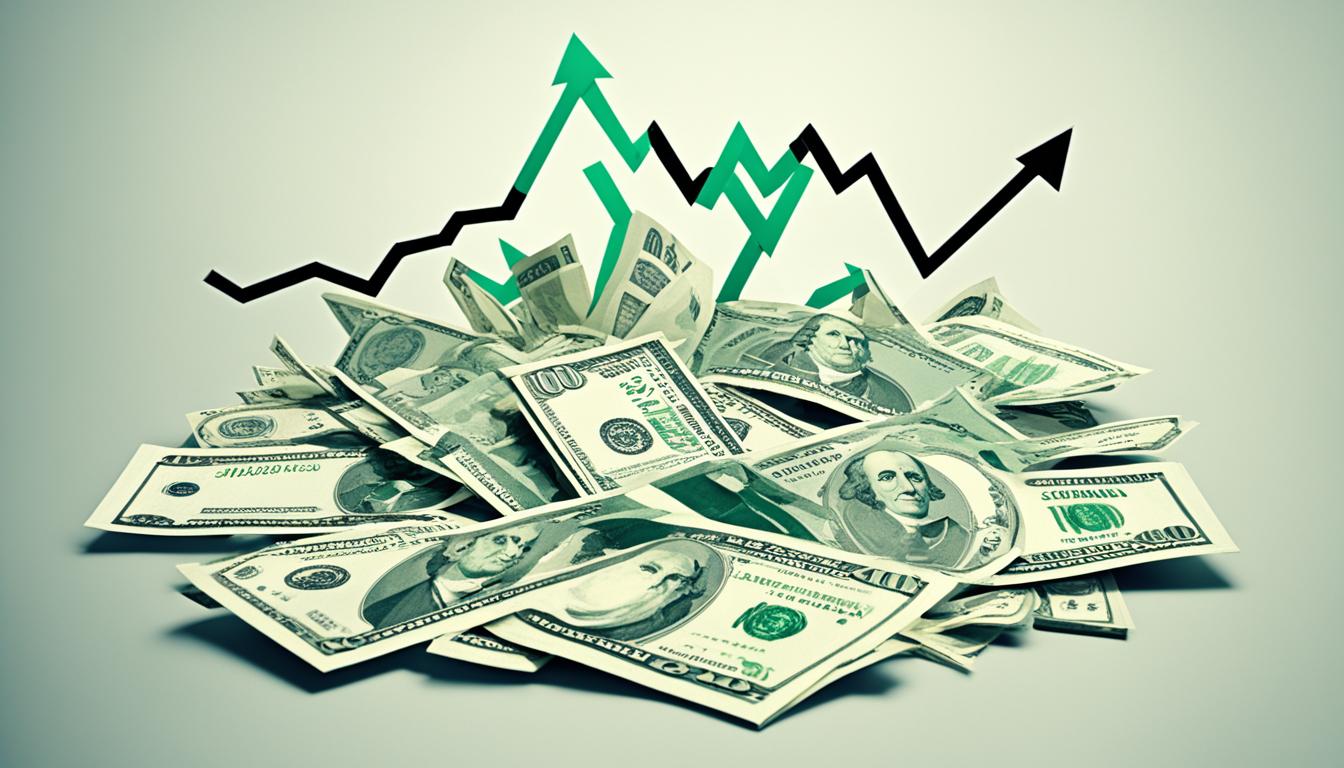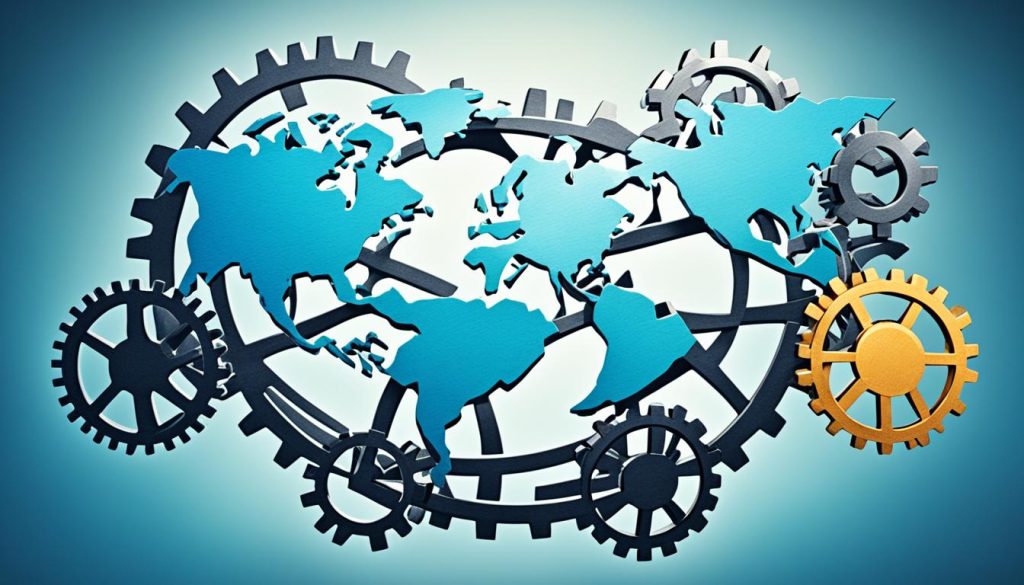In the world of international finance, currency wars have become a big deal. They happen when big countries lower their currency values to get ahead in trade. This makes their products cheaper for others to buy, changing how global trade dynamics work.
Recent events, like what China and the U.S. did with their currencies, have really changed the game. These actions have big effects: they mess with exchange rates and can make the economy unstable. It’s important to understand these moves to see how they affect the world’s financial systems.
Key Takeaways
- Currency wars involve competitive devaluations to gain trade advantages.
- Major economies like China and the U.S. actively engage in currency manipulation.
- Exchange rate manipulation impacts global trade dynamics significantly.
- Currency wars can cause fluctuations in economic stability.
- Understanding currency wars is crucial for international financial strategies.
Understanding Currency Wars
Currency wars happen when countries lower their currency values to get ahead in trade. Governments and central banks do this to make their exports cheaper and boost their economy.
Definition and Overview
Currency wars mean countries making their currency worth less compared to others. This makes their exports cheaper and imports pricier. It helps local production and jobs.
Historical Context
Currency wars have been part of the global economy for a long time. In the 1930s, the U.S. and the British Empire lowered their currency values. The 2000s financial crisis led to more countries doing the same to recover.
Reasons Behind Currency Wars
Countries fight currency wars to grow their economies. They want to get ahead in trade, create jobs, and deal with economic issues. Political leaders also play a big role, as they aim to keep promises and improve people’s lives with lower exchange rates.
| Country | Year | Event |
|---|---|---|
| United States | 1934 | Gold Reserve Act |
| China | 1994 | Yuan Devaluation |
| Japan | 2010 | Yen Intervention |
The Role of Exchange Rates in Currency Wars
Exchange rates are key in currency wars. They affect how countries manage their trade and move through the foreign exchange market. Knowing the difference between fixed and floating exchange rates helps us see how countries use currency manipulation.
Fixed vs. Floating Exchange Rates
Fixed exchange rates are tied to a major currency like the U.S. Dollar or the Euro. This keeps a country’s currency stable within a certain range. But, it also limits how much a country can change its currency value.
On the other hand, floating exchange rates change based on market forces. This gives countries more flexibility but also more ups and downs. China has used fixed exchange rates to keep its exports competitive. This has led to accusations of currency manipulation to balance its trade.
Impact on International Trade
Changes in exchange rates can greatly affect international trade. If a country’s currency is worth less, its exports cost less and are more appealing worldwide. This can lead to trade surpluses or deficits.
But if a currency is too strong, a country’s goods become pricier. This makes imports more popular and can lead to a negative balance of payments.
For example, Japan’s yen was very volatile in the 1980s. To fix trade issues, Japan used currency strategies. These actions changed their trade and how they related to other countries. This shows how currency changes can alter trade volumes and directions worldwide.
Currency Wars and Their Impact on Economic Stability
Currency wars can really shake up the economy of countries involved. They happen when countries lower their currency value to make their exports cheaper. But, this can cause big economic problems, affecting both the country and the world.
Inflation and Deflation Risks
One big worry in currency wars is inflation or deflation risks. If a country lowers its currency value, things imported get pricier, which can lead to inflation. On the other hand, raising the currency value makes exports more expensive and can cause deflation. Both situations make it hard for governments to keep prices stable and keep people’s buying power.
Effect on Employment and Wages
The job market feels the impact of currency changes a lot. A lower currency value makes a country’s goods cheaper abroad, which can create jobs. But, if the drop in value is too much, it can cause high inflation, eating away at people’s wages and what they can buy. On the flip side, a rising currency can lead to job losses in industries that rely on exports, hurting employment and wages.
Central Banks’ Role
Central banks are key in handling currency wars. They use tools like changing interest rates or quantitative easing to keep the economy stable. Banks like the Federal Reserve or the European Central Bank can either lessen or worsen the effects of currency changes. Their actions have been crucial in fighting inflation and keeping the job market steady during currency ups and downs.
Influence of Currency Wars on Financial Markets
Currency wars make global financial markets very unpredictable. These changes can really change how investors act. They affect stock markets and the price of things like gold. It’s important to understand these changes to make smart choices.
Stock Markets and Investment Flows
Currency wars make stock market volatility more common. Changes in currency value can impact company earnings, especially for those with a lot of foreign income. Investors get more cautious, leading to more market speculation and unpredictable market moves.
Changes in currency values can also draw or push away foreign investment. Investors look for the best places to put their money, moving it to markets that seem more stable or promising.
Commodities and Precious Metals
Commodities like oil and gold prices are big targets of currency wars. When a major currency drops in value, gold prices often go up. Investors see gold as a safe place to put their money.
Other commodities also see big price swings, thanks to currency changes. These changes affect supply and demand. Traders and investors need to keep an eye on these factors to make good decisions in the complex global market.
| Aspect | Impact |
|---|---|
| Stock Market Volatility | Increased due to market speculation |
| Foreign Investment | Influences capital inflows and outflows |
| Gold Prices | Rise as a safe-haven during currency depreciation |
| Market Speculation | Amplifies uncertainty and market movements |
Trade Policies and International Relations
Trade policies and currency wars are closely linked. Nations use tariffs and quotas to protect their economies. These actions can cause big tensions and make global trade harder.
When countries devalue their currency, others might use trade policies to fight back. These policies try to lessen the harm to domestic industries. But, they can make working together on trade deals harder. They also strain relationships between countries.
As currency wars grow, they can really hurt how countries get along. This often leads to long fights and stalled talks. Groups like the International Monetary Fund (IMF) and the World Trade Organization (WTO) play a big role. They help keep global trade working by watching over currency use and helping countries talk.
Here’s how different trade policies can affect how countries work together during currency wars:
| Policy Type | Impact on International Relations |
|---|---|
| Tariffs | Can lead to retaliatory measures, escalating geopolitical tensions |
| Quotas | May result in trade imbalances, complicating negotiations |
| Subsidies | Can distort global markets, prompting disputes in trade forums |
| Trade Agreements | Promote cooperation but can be undermined by protectionist policies |
It’s key to understand how these policies work to get through the complex world of global trade. Working together and sticking to fair trade is crucial for keeping the economy stable around the world.
Conclusion
Currency wars have a big impact on the global economy. They mix exchange rates, international trade, and financial stability in a complex way. This article looked into what currency wars are, their history, and how they affect the economy and financial markets.
Keeping exchange rates stable is key for the world economy to grow well. If exchange rates change a lot, it can cause inflation or deflation. This hurts jobs and people’s pay. Central banks try to fix these problems by making smart money policies.
They work with other countries to keep the economy stable. This helps everyone.
The future of currency wars will be shaped by new technology, changes in politics, and shifts in the economy. As things change, working together and following global financial rules is more important than ever. Knowing how currency wars work and their effects is crucial for those who want a strong and stable world economy.
FAQ
What are currency wars?
Currency wars happen when countries lower their currency values to get ahead in trade. This makes their exports cheaper and imports pricier.
How do currency wars impact global trade dynamics?
Currency wars change how countries trade by making some goods cheaper or more expensive. A country might make its exports cheaper by lowering its currency value. But, this can lead to trade issues and tensions with other countries.
What role do central banks play in currency wars?
Central banks are key in currency wars. They use monetary policies to change exchange rates. This can mean changing interest rates or buying and selling currencies on a big scale.
Can you provide examples of historical currency wars?
Yes, there have been currency wars before. For example, during the Great Depression, countries lowered their currency values to get ahead. In the early 2000s, the U.S. and China had currency tensions.
What is the difference between fixed and floating exchange rates in the context of currency wars?
Fixed exchange rates are set against another currency or a group of currencies. They are stable but less flexible. Floating exchange rates change based on market forces. They can be more open to currency devaluations.
How do currency wars affect economic stability?
Currency wars can cause economic problems like inflation or deflation. They can also affect jobs, wages, and financial markets. This makes planning for the economy hard and slows growth.
What impact do currency wars have on financial markets?
Currency wars can make stock markets more unstable. They can change how foreign money flows into a country. This also affects the prices of things like commodities and precious metals. Investors might start to speculate more.
How do currency wars influence international trade policies?
Currency wars might lead countries to use protectionist trade policies like tariffs. This can make things harder for other countries and hurt global economic cooperation.
What are the long-term impacts of currency wars on the global economy?
Currency wars can cause trade imbalances and economic instability over time. They can also make relations between countries worse. This can lead to ongoing economic uncertainty and slow down global growth.
How can understanding currency wars benefit businesses engaged in international trade?
Knowing about currency wars helps businesses predict exchange rate changes. They can manage risks better and make smart choices about pricing, investing, and entering new markets. This helps them stay competitive.






